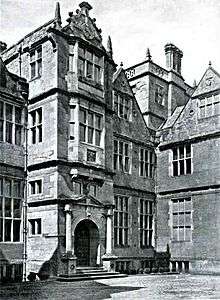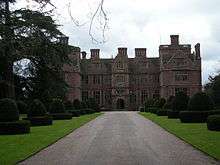Condover Hall

Condover Hall is an elegant Grade I listed three-story Elizabethan sandstone building, described as the grandest manor house in Shropshire, standing in a conservation area on the outskirts of Condover village, Shropshire, England, four miles south of the county town of Shrewsbury.
A Royal manor in Anglo Saxon times, until the 16th century Condover Manor was in and out of Crown Tenure. In 1586 it was purchased by Thomas Owen, a Member of Parliament for and Recorder of Shrewsbury, from the family of the previous owner, Henry Vynar, a London merchant who had died in 1585. Owen had had a lease of the manor from 1578, and been in lawsuit with the family.[1]
For over sixty years since 1946 the Hall had been run as a residential school, initially for blind children when owned by the RNIB and latterly under private ownership as a school for autistic children, covering boy boarders and coeducational day pupils. The school and college both closed during 2009.
Construction

Owen died in 1598 before the new Hall was completed and its designer remains a matter of debate. Building accounts record that a John Richmond of Acton Reynald was the original master mason, but by 1591 Walter Hancock had taken over the position. Lawrence Shipway, the builder of the second (not current) Shire Hall at Stafford also appears to have had some major contribution to the building design. The most compelling evidence can be found in drawings in the Sir John Soane's Museum that seems to prove that the Hall was designed by the influential Elizabethan architect John Thorpe in the early 1590s.
Built out of pink sandstone, quarried at nearby Berriewood, Condover Hall has the typical Elizabethan two-storey high ground floor rooms lit by tall windows with their regular mullions and double transoms. There are fine chimneys, gables and a good example of a strapwork frieze. The grounds are laid out in formal 17th century style with boxed yew hedges and sandstone balustraded terraces decorated with Italianate terracotta vases. Near the Cound Brook there is an amusing flagstaff held by a sandstone gnome.
Later years
Owned by the Owen family until the late 1860s the house then passed to the Cholmondeley family and novelist Mary Cholmondeley (1859–1925) lived in the hall for a few months in 1896 before moving to London. Her uncle, Reginald Cholmondeley (1826-1896) had owned the house when he was host to the American writer Mark Twain (1835–1910) when he visited in 1873 and 1879. The house and estate was sold out of the family in 1897 to Edward Brocklehurst Fielden, who later sold it in 1926.[1]
Local legend holds that no heir to Condover Hall will prosper since the hall was cursed from the gallows by a butler falsely accused of murder: Before Heaven I am innocent, though my master’s son swears me guilty. And as I perish an innocent man, may those who follow my murdered lord be cursed. The butler had been condemned by the lies of the son of Knyvett, lord of the manor, who stabbed his father to death. As he stumbled down the basement stairs, Knyvett reached out his bloodied hand leaving an imprint upon the wall which defied all attempts to wash it away — the marked stone had to be eventually chipped clean.
In 1930 there was a Great Western Railway "Hall Class 4900" Steam locomotive No. 4915 with a 4-6-0 configuration named "Condover Hall" that remained in regular service until 1965. In the 1980s Hornby toys issued an electric toy replica of the engine. The train used in the Harry Potter films as the Hogwarts Express is an identical Hall class locomotive.
Second World War
Between August 1942 and June 1945 the hall was commandeered by the War Office and pressed into service as the officers' mess for nearby RAF Condover.
Residential schools
In 1946 the Hall was purchased from its then owner, William Abbey, by RNIB and operated as Condover Hall School for the Blind,[1] a residential facility for children aged between 5 and 18. RNIB built a covered heated swimming pool for use by the pupils. The hall was sold in 2005 to the Priory Group, who opened a residential school for autistic children and a college for young people with Asperger syndrome. The facility opened in 2006, but in 2008 the closure of both sites was announced.[2] Condover Horizon school closed in January 2009, and Farleigh College Condover closed on 23 July 2009.
The Hall has undergone a multimillion-pound refurbishment programme to turn it into a well equipped residential activity centre. Activities provided range from archery, abseiling to a laser maze and dance studio, the Hall intends to encourage physical activities and deliver cross-curricular learning opportunities. There is even a Harry Potter themed spell room for younger children. Sports teams and events are hosted using the all-weather sports pitches, indoor sports hall and swimming pool, and the centre provides specific Netball coaching and match weekends. The centre can provide accommodation for 500 residents.
With an occupancy of up to 500 people, the accommodation is situated in newly refurbished buildings throughout the estate grounds.
References
- 1 2 3 Pugh, R.B.(editor) (1968). Victoria County History of Shropshire, Volume VIII. Oxford University Press. p. 39.
- ↑ Condover colleges to close due to funding deficiences
- Shropshire by John Newman and Sir Nikolaus Pevsner (1958) ISBN 0-300-12083-4
The college actually closed on 23 July 2009
External links
- www.geograph.co.uk : photos of Condover Hall and surrounding area today
- - Online archive footage of Condover Hall's opening newsreel from 1960
- - Condover Hall today
Coordinates: 52°38′47″N 02°44′52″W / 52.64639°N 2.74778°W